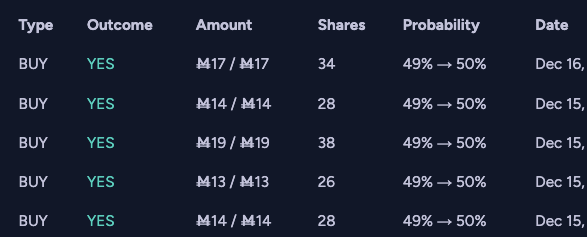The solution to the puzzle is a sequence of five letters.
Let's say you're submitting an answer on November 5th, and you wanted to submit "XABDU" as your solution, you would write a comment: "11/5/25: XABDU".
Please do not try to brute-force this. Each user gets one guess per calendar day, I'm not going to check every single time stamp diligently so don't abuse this rule or I will block you from the market and be sad.
I will check the market once per day (don't worry if I forget or skip a day, I'm human) at a random-ish time. If the value of the market is below 50%, I will give a single hint, which I will compile in the description over time. If the value of the market is above 50% (inclusive), I will not give a hint.
I think this puzzle will be hard. The more time that passes without hints, the less likely you will be to solve it. I anticipate that you will need at least ten hints to solve it, possibly far more. You might need to collaborate. You have until the end of the year!
11/3 Hint 1: Portugal
11/4 Hint 2: harbor
11/5 no hint today
11/6 no hint today
11/7 no hint today
11/8 no hint today
11/9 no hint today
11/10 no hint today
11/11 no hint today
11/12 Hint 3: Nazareth
11/13 no hint today
11/14 no hint today
11/15 Hint 4: [VPP]
11/16 Hint 5: 9gag
11/17 no hint today
11/18 Hint 6: [O-MBRV]
11/19 no hint today
11/20 no hint today
11/21 Hint 7: herring
11/22 Hint 8: [L-MBRV]
11/23 Hint 9: Setúbal
11/24 no hint today
11/25 no hint today
11/26 no hint today
11/27 no hint today
11/28 no hint today
11/29 no hint today
11/30 no hint today
12/1 no hint today (but it is my birthday 🥳, that's not a hint)
12/2 no hint today
12/3 no hint today
12/4 no hint today
12/5 no hint today
12/6 no hint today
12/7 no hint today
12/8 no hint today
12/9 no hint today
12/10 no hint today
12/11 no hint today
12/12 no hint today
12/13 no hint today
12/14 Hint 10: Presidente
12/15 Hint 11: Santos
12/16 Hint 12: 9lives
EVERYTHING BELOW THIS LINE IS AI SUMMARY GIBBERISH
The creator will not reply to every guess. If there is no reply to a guess, assume it is not correct.
Incorrect guesses will be acknowledged with a like from the creator (rather than a written reply). If there is no response to a guess, assume it is incorrect.
If no one guesses the correct solution by the market close date (midnight on 2025-12-31), the market will resolve NO.
The market can resolve YES immediately upon a correct guess being seen by the creator, prior to the market close date.
The solution must consist of five letters from the English alphabet (the 26 standard letters A-Z). Non-English characters are not valid.
Guesses containing non-English alphabet characters (such as accented letters like Í, Ó, etc.) will be treated as their unaccented English equivalents (e.g., SÍTIO will be treated as SITIO).
The creator will not trade on this market.
All guesses must include a date in the submission. The format can be flexible as long as it's legible. This is to avoid ambiguity about which comment constitutes a user's daily guess.
Guesses will not be invalidated based on timezone differences between the guesser and the creator. Users may use their local timezone when dating their guesses.
If the creator misses announcing a hint/no-hint on a given day, they will apply that day's result (based on whether the market was below/above 50%) the morning after they next check the market, rather than skipping that day entirely.
@ItsMe I think you could wait for someone to come along and disprove my statement. Until then I will wait.
Or maybe it refers to this random guy who is from the coast known as Hawke's Bay. And 9gag was made by people from Hong Kong, which is also coastal.
@ItsMe The thing is, cats don't like water so there is NO WAY a cat can catch and eat a herring. So you are going to need to work harder than that to link Cats to Herring.
@Galahad You're such a troll bot. I will buy all your No shares if you promise to stop doing this every time we all look away.
PortB today 16th December
fixed
12/15/25 LMBRV (prob already tried but not on the eliza list?)
@realDonaldTrump i don't know, i feel like the Eliza list might be a distraction. there's decent guesses on it which haven't been made yet.
